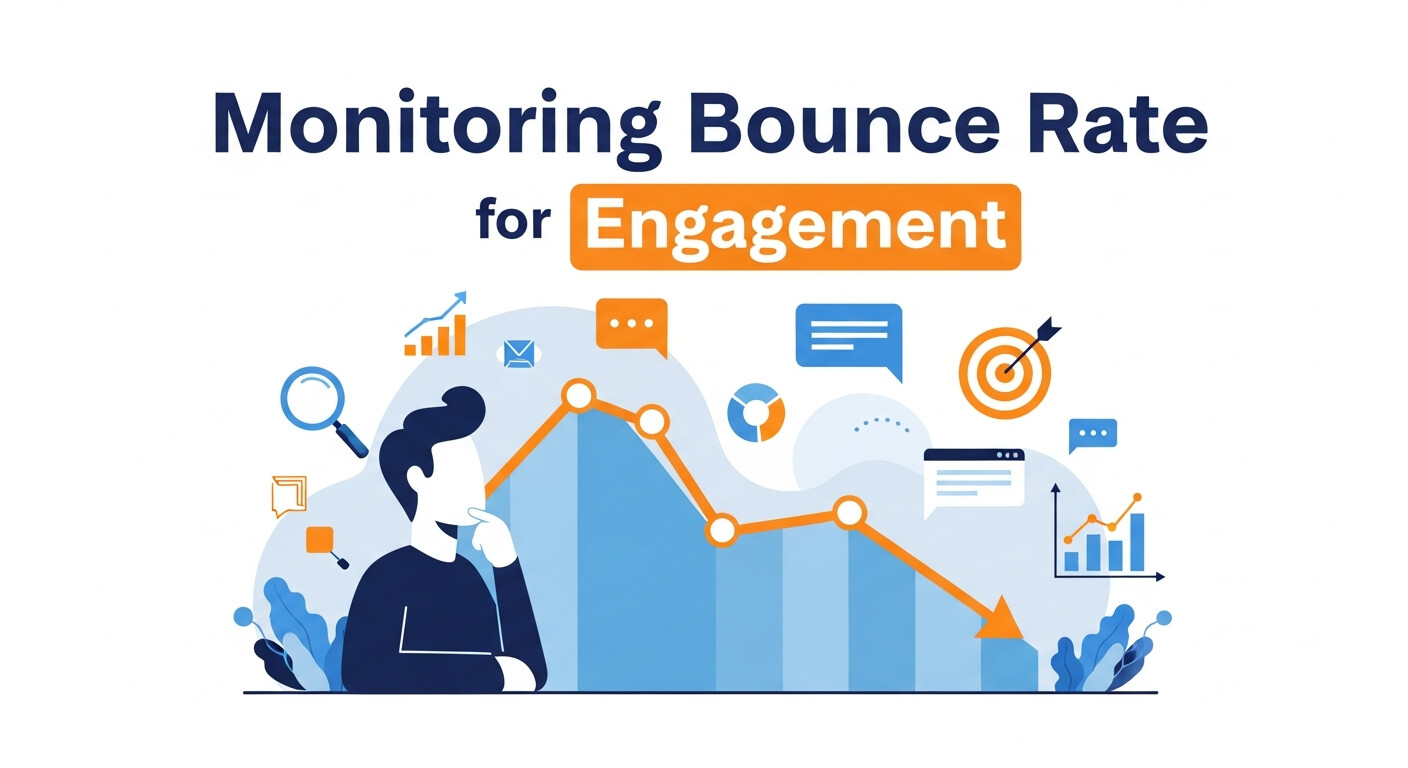SEO success isn’t just about climbing to the top of search engine rankings. It’s about understanding whether your strategies are driving meaningful traffic and achieving your business objectives. That’s where Google Analytics plays a vital role. By offering powerful insights into website performance, user behavior, and traffic sources, this tool enables businesses to fine-tune their SEO efforts for maximum impact.
The Importance of Measuring SEO Success
Measuring the success of your SEO strategies is essential for several reasons:
- Optimized Resource Allocation: Without a clear picture of what’s working, you could waste valuable time and money on ineffective tactics.
- Data-Driven Decisions: Performance metrics help you adjust your approach based on what resonates with your audience.
- Staying Ahead of Competitors: By consistently tracking metrics, you can identify opportunities to outperform your competitors.
SEO isn’t just a one-time effort; it’s a dynamic process that requires ongoing monitoring and tweaking. And with Google Analytics, you have the tools you need to measure and optimize every aspect of your strategy.
How Google Analytics Measures SEO Success

1. Track Organic Traffic Performance
The first step in determining SEO success is monitoring your organic traffic. This metric shows how many visitors are landing on your site after clicking on your search results.
How to Check Organic Traffic in Google Analytics:
- Go to Acquisition > All Traffic > Channels.
- Click on “Organic Search” to view performance metrics for traffic originating from search engines.
- Analyze the trends to see whether your SEO efforts are driving an increase in visits.
Pro Tip: Compare organic traffic across time frames (e.g., month over month or year over year) to spot significant trends and growth.
2. Analyze User Behavior
A high volume of traffic doesn’t mean much if visitors aren’t engaging with your content. User behavior metrics available in Google Analytics can help you evaluate whether your site is meeting user needs:
- Bounce Rate: This measures the percentage of visitors who leave your site after viewing just one page. A high bounce rate might indicate that users aren’t finding what they’re looking for.
- Pages Per Session: This shows how many pages a user visits in one browsing session. It’s a great indicator of whether your website content is engaging.
- Average Session Duration: This metric reveals how long visitors spend on your site. Longer durations usually indicate more valuable content.
Regularly reviewing these metrics will highlight opportunities to optimize your content and improve user retention.
3. Leverage Keyword Insights
Keyword rankings are a critical aspect of SEO success, but Google Analytics supports this data with even deeper insights:
- Search Queries: Link Google Analytics with Google Search Console to track which queries are driving traffic.
- Landing Page Performance: Evaluate which pages rank well for various search terms and identify areas to optimize.
When you understand how keywords are contributing to your traffic, you can refine your SEO strategy to focus on high-performing search terms that generate the most value.
4. Evaluate Backlink Impact
Backlinks from reputable websites remain a major ranking factor in SEO. Google Analytics helps you understand the quality and impact of backlinks through referral traffic:
- Navigate to Acquisition > All Traffic > Referrals to see which external sites are driving visitors to your page.
- Identify high-performing sources of referral traffic and explore partnerships to gain even more backlinks.
- Pinpoint lower-quality referrals and investigate whether you should disavow those links.
By keeping track of referral traffic, you can build smarter link-building strategies and attract more authoritative backlinks.
5. Track Goals and Conversions
Ultimately, the success of your SEO efforts boils down to whether you’re achieving your business goals. Google Analytics allows you to set and track specific goals, such as:
- Newsletter sign-ups
- Purchases or sales
- Form submissions
- App downloads
To set up goals in Google Analytics:
- Click on the “Admin” tab and select “Goals.”
- Choose the type of goal you want to track and define its parameters (e.g., destination, duration, event).
- Monitor these goals under Conversions > Goals > Overview.
By tying your SEO strategy directly to measurable outcomes, you can ensure it’s delivering tangible returns.
Understanding Organic Traffic Trends

Organic traffic shows how visitors reach your site via search engines without paid ads. Tracking trends in organic traffic allows you to see whether SEO strategies are effectively increasing visibility. Google Analytics lets you compare traffic over time, identify seasonal patterns, and spot sudden drops or spikes. This insight helps you determine which content resonates most with your audience and where improvements are needed. By analyzing sources, devices, and locations of organic visitors, businesses can tailor content and campaigns more effectively, ensuring long-term growth and higher engagement from users actively seeking their products or services.
Monitoring Bounce Rate for Engagement Insights

Bounce rate measures the percentage of visitors who leave your site after viewing only one page. A high bounce rate may indicate irrelevant content, poor user experience, or slow page load times. Google Analytics helps identify pages with high bounce rates and allows for deeper analysis of why users leave. Optimizing these pages by improving content, adding internal links, and enhancing navigation can boost engagement. Tracking bounce rate trends over time ensures that SEO efforts not only attract visitors but also keep them engaged. Lowering bounce rate typically results in longer sessions and higher conversions.
Optimizing Pages Per Session
Pages per session measures the number of pages a visitor views in a single visit. A higher number indicates engaging content and effective internal linking, while a lower number may suggest navigational or content issues. Google Analytics allows you to track which pages users visit most and the paths they follow. By analyzing this behavior, businesses can create strategies to guide visitors toward key conversion pages. Enhancing content quality, interlinking relevant pages, and offering clear calls-to-action can improve this metric, ultimately increasing user engagement, time spent on site, and the likelihood of achieving SEO and business goals.
Evaluating Average Session Duration
Average session duration reveals how long visitors spend on your site per session. Longer durations generally indicate engaging, high-quality content, while shorter sessions may signal issues with relevance or usability. Google Analytics provides insights into session length for different pages, devices, and user types. By analyzing this data, you can optimize content structure, improve readability, and strategically place calls-to-action. This ensures users spend more time exploring your website, absorbing information, and moving through conversion paths. Tracking session duration over time helps identify which strategies enhance engagement and keeps your SEO performance aligned with business objectives.
Leveraging Referral Traffic Insights
Referral traffic tracks visitors coming from external websites. Google Analytics helps identify which sites drive high-quality traffic, allowing businesses to evaluate backlink effectiveness. Understanding referral sources enables better partnership and link-building strategies, targeting authoritative sites for improved SEO impact. Low-quality referrals can be investigated for potential disavowal to protect domain authority. Monitoring referral trends also provides insight into content performance across different channels. By leveraging referral traffic insights, businesses can strengthen their digital presence, attract a more relevant audience, and create opportunities for collaborations that amplify reach, drive conversions, and improve overall SEO results.
Tracking Conversions with Goal Setup
![]()
Conversions are the ultimate measure of SEO success, showing whether website visitors complete desired actions such as purchases, sign-ups, or downloads. Google Analytics allows you to set up Goals, which track these actions and provide actionable insights. By defining destination URLs, durations, or events, you can monitor which SEO campaigns or pages contribute most to conversions. Tracking goals allows businesses to allocate resources efficiently, optimize high-performing pages, and adjust underperforming areas. Continuous monitoring of goals ensures your SEO strategy directly aligns with business objectives, making it possible to calculate ROI and make data-driven decisions to enhance performance.
Segmenting Audiences for Targeted SEO
Google Analytics allows audience segmentation, separating users by demographics, behavior, source, or device type. This helps identify which user groups respond best to specific content or SEO efforts. Segmenting audiences allows for more personalized strategies, such as creating targeted landing pages, improving engagement, and increasing conversions. For example, analyzing returning visitors versus first-time visitors can reveal opportunities to nurture loyalty or improve onboarding experiences. Segmentation also provides insight into regional trends, age groups, and devices, helping businesses prioritize optimization efforts. Tailored SEO strategies based on audience segments improve relevance, engagement, and overall ROI.
Using Custom Dashboards for SEO Clarity
Custom dashboards in Google Analytics consolidate key SEO metrics in one view, saving time and providing a clear picture of performance. Businesses can include metrics such as organic traffic, bounce rate, conversions, keyword performance, and referral sources on a single dashboard. This allows for quick identification of trends, problem areas, and opportunities. Dashboards can be shared with teams for collaborative decision-making, ensuring everyone aligns with business goals. By regularly monitoring a custom dashboard, marketers can respond faster to changes, track improvements, and make data-driven adjustments, creating a more efficient, informed, and results-oriented SEO strategy.
Using Advanced Google Analytics Features for SEO
Once you’ve mastered the basics, take your SEO tracking up a notch with these advanced Google Analytics features:
- Segment Your Audience: Use the audience segments feature to analyze specific user groups, such as first-time visitors or returning customers. This helps you tailor your SEO strategy to meet their needs.
- Attribution Models: Go beyond last-click attribution to understand how other touchpoints contribute to conversions.
- Custom Dashboards: Build custom dashboards to consolidate your most important SEO metrics in one place, making it easier to monitor progress.
These features enable more nuanced analysis, allowing you to maximize the effectiveness of your SEO efforts.
Actionable Steps to Improve SEO with Google Analytics
- Conduct an in-depth audit of your existing SEO performance using the metrics outlined above.
- Optimize well-performing pages with fresh keywords, updated content, or improved visuals.
- Address high bounce rates by focusing on content relevance and user experience.
- Regularly review goal completions and adjust your strategy based on business objectives.
Remember, the best SEO strategies are those that prioritize long-term value and continuous improvement.
Take Control of Your SEO Strategy
Google Analytics isn’t just a tool for tracking data; it’s a blueprint for SEO excellence. By exploring its features and regularly analyzing your website’s performance, you can refine your strategies, scale organic traffic, and outperform competitors.
If you’re ready to elevate your SEO game, start using Google Analytics today. Not sure where to begin? Check out our resources to help you make the most of this must-have tool.
Frequently Asked Questions (FAQ) – SEO Success with Google Analytics
1. Why is measuring SEO success important?
Measuring SEO success helps you understand whether your efforts are driving meaningful traffic, engagement, and conversions. It ensures your resources are used efficiently and helps you stay ahead of competitors by identifying high-performing strategies.
2. What key metrics should I track in Google Analytics?
Important metrics include organic traffic, bounce rate, pages per session, average session duration, referral traffic, and goal conversions. These indicators reveal how users interact with your site and how effective your SEO is.
3. How can I track organic traffic in Google Analytics?
Go to Acquisition > All Traffic > Channels, then click Organic Search. You can monitor trends over time to see how well your SEO campaigns attract visitors from search engines.
4. What role do keywords play in Google Analytics?
By linking Google Analytics with Google Search Console, you can see which search queries drive traffic, which landing pages rank for those queries, and which keywords generate the most value.
5. How can backlinks be evaluated using Google Analytics?
Referral traffic in Acquisition > All Traffic > Referrals shows which external websites are sending visitors. Analyzing high-quality referrals helps improve link-building strategies and boosts SEO performance.
6. How do I track SEO-related goals and conversions?
Set goals in Admin > Goals, specifying actions like newsletter sign-ups, purchases, or form submissions. Monitor them under Conversions > Goals > Overview to measure the tangible impact of your SEO.
7. What advanced features of Google Analytics improve SEO analysis?
Features like audience segmentation, custom dashboards, and attribution models allow deeper insights into user behavior, conversion paths, and campaign performance, enabling more strategic SEO decisions.
8. How can I improve SEO using Google Analytics insights?
Use analytics to optimize high-performing pages, refine keywords, improve user engagement, reduce bounce rates, and adjust strategies based on goal completions. Continuous monitoring ensures long-term SEO success.
9. Can Google Analytics alone guarantee SEO success?
While Google Analytics provides crucial data, success also depends on quality content, technical SEO, link-building, and ongoing strategy adjustments. Analytics is a guide, not a replacement for comprehensive SEO practices.
10. How often should I review Google Analytics for SEO?
Regular monitoring—weekly or monthly—is recommended. Frequent review allows you to spot trends, identify issues early, and make timely adjustments to improve traffic and conversions.
